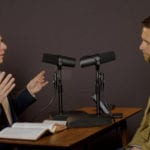Most readers of The Gospel Coalition probably aren’t familiar with the story of Northland International University. In fact, many readers of this blog have probably never heard of Northland at all. But for more than 50 years God has been doing some amazing things in northeastern Wisconsin at Northland Mission Camp, then Northland Baptist Bible College, and now at Northland International University.
As the camp ministry grew and a small Bible college launched on the property, the school had a decided emphasis on the proclamation of the gospel and servant leadership. Along with that, however, the college was also connected to the fundamentalist movement. This connection led to an uncompromising position on separation from the world in nearly every way and a strong stance against certain types of music and ministry. Not only did the school take strict positions on many of these less-than-clear issues, but it also drew strict lines of separation from those who did not. By the time I arrived on campus as a freshman in 1998, Northland was a pretty separated place. Most types of modern music were off limits, as were most movies, TV shows, and other popular media. In the classroom, we read books by authors like John Piper, R. C. Sproul, and John MacArthur, but they always came with a disclaimer. I spent my last two years on campus wrestling over the theological and exegetical foundations for these practices and felt like we needed to be somewhere more biblically and theologically robust. So in the summer of 2002, we packed up and moved to Minneapolis, where I started the apprenticeship program at Bethlehem Baptist Church. But I knew this move would lead to a separation from Northland. While I certainly maintained relationships with many on campus, I assumed that I would never be able to have close ties to my alma mater. There was much about Northland to love: a unique emphasis on servant leadership; a humble administration, faculty, and staff; a strong love for the Word of God; and a radical commitment to world missions. But it seemed like the strict separatism and all that went along with it would keep me, and many other alumni from my generation, from having close relationships with Northland. It was a fundamentalist school in every meaningful sense of the word, and none of us expected that to change.
Deeper Root
But God was at work in ways many of us alumni never expected. The centrality of the gospel was taking deeper root at the school, and the results we have seen are encouraging. Over the course of three or four years, Northland underwent some important transformations, including receiving accreditation and changing some of the unnecessary rules. But more importantly, Northland became a place where the gospel is at the center, and rules and regulations are not. In a recent letter, outgoing Northland president Matt Olson listed some of the changes the school underwent in the last few years. He explained:
- Northland went from the exclusive use of the King James Version in the pulpit and classrooms to allowing other translations.
- Northland went from a demerit system to a discipleship platform for our students. Yes, we still have rules: we still confront, and we still have consequences. We just believe we have a better and more biblical model now. It is built on relationships. We are always looking for better ways to accomplish our mission.
- Northland went from practicing some forms of “secondary separation” to what we now understand to be a more biblical separation. Where we would not have had men like John MacArthur, Rick Holland, Ken Ham, Bruce Ware, or Mark Dever, we would now. We see no reason to separate from these men. We would consider them to be in the spirit of historic fundamentalism; they believe in the orthodox faith, will separate over it, and live godly lives.
- Northland went from only allowing “traditional” styles of music to accepting more modern styles as well. A blend of traditional and current music is used in our programs and chapel.
- We created an overarching name of Northland International University to give our students greater opportunities with the gospel worldwide. The change was driven by our passion to reach every tribe, tongue, people, and nation.
Re-Centering
I don’t pretend to speak for Northland. I have recently re-connected with some of the leaders at the school and teach an occasional course for their distance program. That doesn’t mean I agree with everything the school says and does. But I have seen the way a re-centering in the gospel can transform a school, and for that I praise God.
Some of my fellow Northland alumni are upset because the school did not change fast enough or pursue change in the way they would have done it. Others are upset because they thought nothing should change. Ever. Still others are upset because of Olson’s departure on the heels of many of these changes. To those alumni and friends, I would simply ask that you to grant the same grace to the institution that you would to a fellow Christian who is growing in grace. We will all make mistakes, and we all have room for growth. We can all learn from the example of an institution that is willing to further submit itself to God’s Word—in spite of the criticism and challenges these changes will bring. So pray for Northland as it searches for a new president and be praying about God’s continued work there, knowing that when the gospel moves to the center, amazing things can happen to an individual, a church, and even a fundamentalist school.
Involved in Women’s Ministry? Add This to Your Discipleship Tool Kit.
 We need one another. Yet we don’t always know how to develop deep relationships to help us grow in the Christian life. Younger believers benefit from the guidance and wisdom of more mature saints as their faith deepens. But too often, potential mentors lack clarity and training on how to engage in discipling those they can influence.
We need one another. Yet we don’t always know how to develop deep relationships to help us grow in the Christian life. Younger believers benefit from the guidance and wisdom of more mature saints as their faith deepens. But too often, potential mentors lack clarity and training on how to engage in discipling those they can influence.
Whether you’re longing to find a spiritual mentor or hoping to serve as a guide for someone else, we have a FREE resource to encourage and equip you. In Growing Together: Taking Mentoring Beyond Small Talk and Prayer Requests, Melissa Kruger, TGC’s vice president of discipleship programming, offers encouraging lessons to guide conversations that promote spiritual growth in both the mentee and mentor.

































